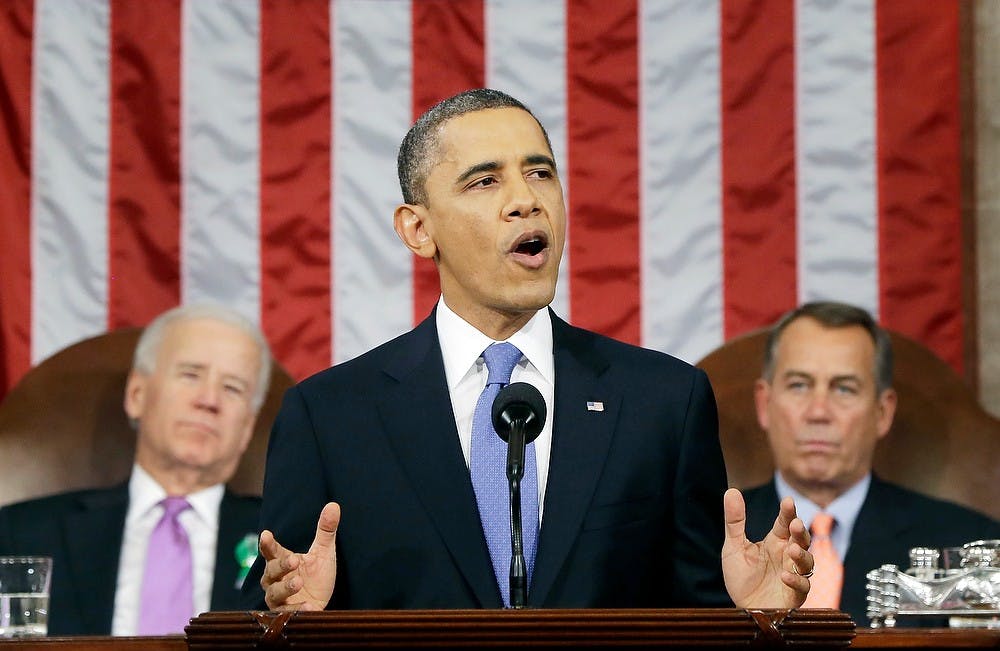Howard Akumiah spent his Tuesday night in front of two screens: one playing the historical face off between the Spartans and Wolverines, and the other broadcasting the president’s plans for the nation in the upcoming year.
“The State of the Union had sound but the game was silent,” he said.“I was a good Spartan and I kept abreast of some political issues.”
Akumiah was one of about 20 MSU Roosevelt Institute students and millions of Americans to watch President Barack Obama’s State of the Union Address, an annual synopsis of the president’s goals for the upcoming year and the progress of the country.
Obama’s speech touched on raising the federal minimum wage from $7.25 to $9 and combating skyrocketing tuition rates and student loans. He called for reforming the Higher Education Act to ensure the federal government uses affordability and value for students’ money to determine how much grant money they receive.
“Colleges must do their part to keep cost down and it’s our job to make sure that they do,” he said.
He said the government will provide College Scorecards to help parents and high school students compare universities to make the best decision.
Obama also focused on reducing the nation’s debt and bringing enough jobs to the country to create a new revolution of manufacturing in the U.S. — a goal that could help students entering the workforce.
MSU political science assistant professor Matt Grossmann said although Obama might find ways to help higher education this year to help prepare students for those jobs, the president likely will be busy tackling the other expansive goals on his to-do list.
“He’s already decided to pursue gun control, immigration and deficit deadlines, so those issue will be at the top of the agenda,” he said.
After the Newtown, Conn., shooting, Obama issued executive orders to tighten gun control and increase federal aid for school safety resources. He also promised to help 11 million undocumented immigrants become U.S. citizens during a speech Jan. 29, a move that might help Michigan students who were brought to the state illegally as children.
The president addressed the $1 trillion automatic spending cuts slated to take effect by the end of the month and said both parties agree they’re a bad idea.
“Our work must begin by making some basic decisions on our budget — decisions that will have a huge impact on our recovery,” he said.
Obama proposed balanced deficit reduction through Medicare reforms that could save about $340 million in 10 years. He said he is open to reform solutions from both parties, as long as they don’t interfere secure retirement for the nation’s aging population.
The president said his economic proposals will not increase the nation’s $16 trillion debt.
Social relations and policy sophomore Maya Greifer said within a few years, most students will head into the job force and would be smart to watch the address to see how political leaders affect the economy.
“It’s all going to affect us more than anyone else,” she said.
Despite potential implications for higher education funding and school safety, students might not have seen a reason to tune in to the speech.
A Pew Research Center survey conducted prior to the State of the Union found a majority of Americans did not expect this year’s address to be more important than last year’s.
The study showed 43 percent felt this year’s would be equally as important, about 32 percent felt it would be more important and 15 percent felt it would be less important than last year’s address.
“A lot of people were involved in the election in the sense that they wanted to see their party win,” Greifer said. “Now that it’s over, people aren’t invested as much.”
MSU College Republicans Vice Chair Cody Hibbs said Obama didn’t spend a lot of time focusing on helping students this year because much of his time was spent campaigning.
“I don’t think he was very pragmatic in his style of governing,” he said.
Hibbs said he hopes Obama will focus on strengthening national security and the defense budget, a hot topic in Washington after Obama nominated Nebraska’s former Republican Sen. Chuck Hagel to be the U.S.’s next defense
secretary.
Greifer said Obama has been college students’ “biggest advocate” for creating ways to help manage loans.
Support student media!
Please consider donating to The State News and help fund the future of journalism.
This past summer, student loan interest rates were set to double July 1, but Obama and Congress passed legislation and averted the price hike. The White House also created the Pay As You Earn program to help students repay loans based on their income after graduation.
Other topics the president touched on included lowering gas prices, repairing roads, mandating a good preschool education be available for every child, recovering the house market and cutting the energy wasted in homes in half.
Discussion
Share and discuss “Students re-focused on in State of the Union” on social media.







